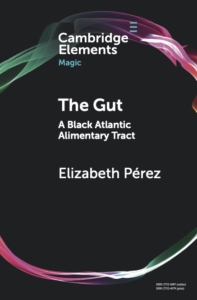Welcome to our series, “Excellent Excerpts,” where we share selections from recently or soon-to-be published books we think you should check out! In this post we are featuring The Gut: A Black Atlantic Alimentary Tract by Elizabeth Perez, published with Cambridge University Press.
Book Synopsis:
If the head is religion, the gut is magic. Taking up this provocation, The Gut delves into the digestive system within transnational Afro-Diasporic religions such as Haitian Vodou, Brazilian Candomblé, and Cuban Lucumí (also called Santería). It draws from the ethnographic and archival record to probe the abdomen as a vital zone of sensory perception, amplified in countless divination verses, myths, rituals, and recipes for ethnomedical remedies. Provincializing the brain as only one locus of reason, it seeks to expand the notion of ‘mind’ and expose the anti-Blackness that still prevents Black Atlantic knowledges from being accepted as such. The book examines gut feelings, knowledge, and beings in the belly; African precedents for the Afro-Diasporic gut-brain axis; post-sacrificial offerings in racist fantasy and everyday reality; and the strong stomachs and intestinal fortitude of religious ancestors. It concludes with a reflection on kinship and the spilling of guts in kitchenspaces.
From the Introduction:
Academics spend a lot of time in their heads. Historians and anthropologists live in other people’s heads too, or at least try to imagine what it might be like there. And to be a scholar or practitioner of Black Atlantic traditions – particularly of initiatory ones like Haitian Vodou and Brazilian Candomblé – is to know the head as a vessel for the gods’ divine power. In Afro-Diasporic religions, the crown of the skull is the focus of forceful, recurrent ritual intervention. The word for head in the West African Yorùbá language, orí, refers to both the physical head and the sacred embodiment of one’s personal destiny dwelling within it.
The West African oracular system called Ifá is not only highly cerebral but also thematizes orí, and Ifá’s ongoing globalization has done much to promote the head as a central spiritual site.1 According to this religious ideology, just as a person’s physical head (Orí-Òde in Yorùbá) is unique, so too is their inner self or fate (Orí-Inú).2 Not every Black Atlantic tradition shaped by these principles – directly or indirectly – regards the head in the same way, but its preeminence over the rest of the body is unquestioned
…
What follows is an alimentary tract, a brief treatise on the gut in Black Atlantic traditions that crystallized during the transatlantic slave trade. The purpose of this book is not to dethrone the head as the king of the AfroDiasporic religious body, but to secure acknowledgment that it is not the only place in the body where thought takes shape. Practitioners have long possessed and imparted insights about the “thinking gut” and its indispensable role in the consolidation of religious families and communities. The extensive connections between the human gut and brain feature prominently in recent immunological research on the “gut microbiome” and in the emerging field of neurogastroenterology. Although the concept of the “thinking gut” has gained significant traction within the past decade, religious studies as a discipline has yet to grapple with this paradigm shift – with the growing consensus that the gut not only deliberates but has definite opinions (Lucas 2018; Modern 2021).
…
Black Atlantic “embodied physiology,” storytelling, and ceremonies that thematize the gut have emphasized the gut’s ability to act decisively and produce knowledge (Daniel 2005: 74). The gut’s vulnerability to magic and sorcery, particularly through the ingestion of noxious substances, has given rise to a rich pharmacopeia. Indeed, among the chief undertakings of Afro-Diasporic healers and diviners has been the alleviation of suffering caused by the stomach and intestines. Their ministrations have implicated patients in the world of the gods and ancestors, leading not infrequently to their clients’ transformation into religious subjects. As practitioners, they have discovered that, to serve the spirits, they must occasionally – and sometimes permanently – surrender control over their guts. Even today, devotees are obliged to consume special foods in rites of passage and consent to the imposition of food taboos that may be lifelong. The gut is experienced in perhaps the most intense and memorable way through sensations suddenly perceived within it, and practitioners of AfroDiasporic religions have historically singled out abdominal aches, pains, and twinges as messages from the gods and ancestors. The murk of the gut conduces to the play of concealment and revelation that characterizes Black Atlantic symbolism and ritualization. To grasp the significance of gut feelings, instincts, and reactions, it is necessary to probe into their discursive construction (as common idioms that may not index actual sensations at all) as well as their tangible materiality. Sometimes people say they feel something in their gut because they do; at other times they cite gut feelings in the absence of somatic stimuli as verbal shorthand for hunches and sentiments that should not – or cannot – be ignored.
What can be gleaned about the gut from the speech genres in which it appears? For some compelling answers, we might look to affect theory. But despite its conceptual and methodological sophistication, the contemporary scholarship on affect and emotion tends to dichotomize mind and body – brain and belly – to a greater extent than Afro-Diasporic religions do. In this corpus as in everyday parlance, the gut is synecdochic of the body and the really real, an undeniable quantum vibrating with untold potentiality that no representation can fully capture (Mazzarella 2009: 299). I nevertheless take abundant inspiration from Sara Ahmed’s ([2004] 2014) trenchant exploration of the “stickiness” of feeling, along with other scholars attentive to sentiment and sensation in the formation of subjectivities.
Excerpted from The Gut: A Black Atlantic Alimentary Tract by Elizabeth Perez (© Elizabeth Pérez, 2023).
You can order the book here.
